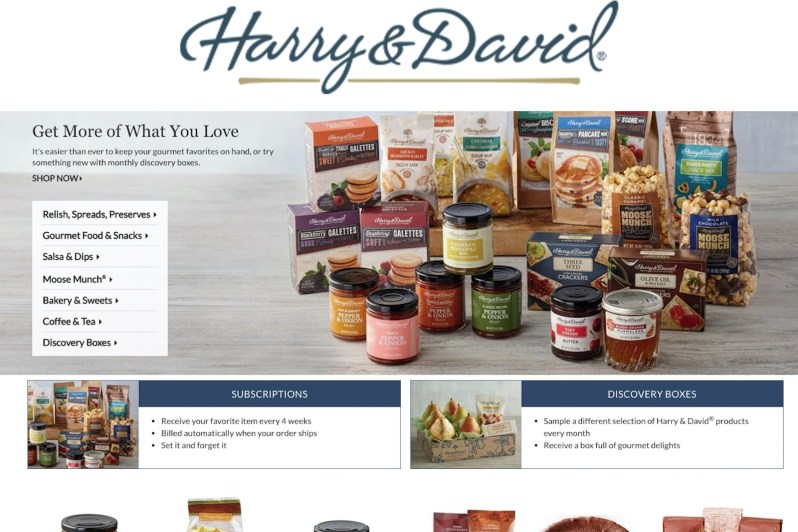It must have been something to pick up an issue of Time or National Geographic back in the 1930s and see an ad for Harry & David. To pause at the opportunity to taste something grown thousands of miles away, delivered to your flat by the power of mail order. The intrepid company was on to instant gratification well, well before the rest of the pack.
Of course, instant in those times meant by post and hence, a bit of a delay. But you didn’t have to leave the comfort of your dwelling to experience high-quality fruit or candies. You could even join a fruit of the month club or elect to sample the “rare fruit” that Harry & David assembled.
We associate Harry & David today with the gift baskets our parents adore. But the outfit essentially began as a small pear-growing operation in southern Oregon in 1910, buoyed by fertile growing conditions and some standout fruit. Remarkably, the orchard itself dates back to 1885.

Those early years were devoted to the “Royal Riviera” pear, named so to appeal to the Europeans the company mostly shipped to. The Great Depression turned the world economy on its head and soon, Harry & David had to appeal to the domestic palate. Enter refrigeration and improved transit and you have the beginnings of a landscape-changing company.
This was “farm fresh” well before the phrase became tedious (and sometimes meaningless). Before long, the company was dabbling in other fruits and higher-end bites. The Baby Boomers may have had their ritual of taking the wagon to the supermarket for groceries, but Harry & David still offered something special — fresh seasonal produce, in thoughtful bundles. Given the commercialization of just about everything come mid-20th century, this type of curation was a novelty.
Presently, Harry & David is still at it. The project is much larger now, with its own line of branded wines and food items that extend into baked goods and chocolates, not to mention flowers and plants. As with most retailers these days, conditions aren’t necessarily optimal, but the company is surviving. In fact, earnings over the last few years have been quite respectable, to say the least.

But should it feel so remarkable? Amazon has ushered in a new era of ease, that’s for certain, but it’s not always shadowed by quality. Harry & David has stressed gourmet since the get-go and mostly continues to do so. And like a good chocolatier or florist, there’s something timeless about a hand-selected grouping of gifts (fitting then that 1-800-Flowers bought the company for $142 million in 2012, a move that’s proven to have been pretty profitable).
Harry & David remains in southern Oregon; based in Medford, it is one of the area’s largest employers. It sells online now, as well as via retail spots all over the country. As you might expect, it does the lion’s share of its business during the gluttonous holiday stretch. The Royal Riviera pear is still popular and the fruit shows up a bit quicker than it used to.
Countless companies since owe their inspiration and success to the pear-purveyors-turned-gift-box-specialists. Harry & David’s approach helped pave the way for everybody from HelloFresh to Drizly. Who knows, perhaps our longstanding interest in well-compiled boxes of complimentary foods will outlast even the newest apps and genuinely instant services.


